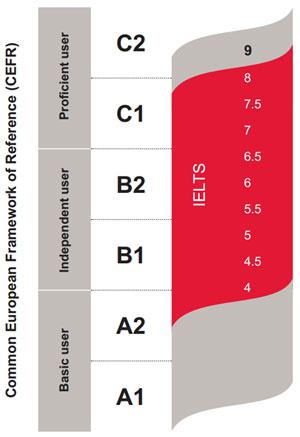This is how IELTS scores compare to the CEFR levels:

But which exam is right for you? Today, I will look at the IELTS, the International English Language Testing System, developed by Cambridge in response to the American TOEFL (I will cover TOEFL in the next article).
Unlike the traditional Cambridge Exams (First, Advanced, Proficiency), you do not get "pass" or "fail". Instead, you get a grade from 1 to 9, reflecting your level. Whether the level you reach is enough for a university place or a specific job will depend on the individual university and employer. In addition, it is used for immigration purposes in Australia and, in the near future, it will be requirement in the UK. American universities increasingly recognise IELTS, although they may still prefer TOEFL.
Typically, a score of 5.5 is the bare minimum anyone will require. A normal university will require a 6.5. Better universities will require a 7.0 or more. So, it all depends on how you plan to use this certificate. There are two versions of the exam: general and academic. The difference, however, is quite small and candidates are advised to do the academic version as it is more readily recognised
What are the pros and cons?
Pros:
- It is replacing the traditional Cambridge exams (First, Advanced, Proficiency)
- International recognition increases every year. Some say IELTS will be the international standard in the future. In Asia, for example, all young people opt for IELTS rather than the traditional Cambridge exams like FCE, CAE, CPE.
- You do not fail. You get a score that corresponds to a specific level.
- Accepted by UK/Australian universities, Australian/UK governments. Increasingly accepted in the USA.
- Tests 4 skills: reading, writing, listening, speaking
- There is no "Use of English" section (the horrible part in FCE, CAE, CPE)
- It is highly structured. So, to some extent, it can be more predictable
- You get sufficient time to read the instructions and prepare to answer the questions
- There is a lot of material available to prepare for this exam
Cons:
- In the listening section, you will always listen to each track ONLY ONCE. It is very easy to miss answers because you do not get a second chance! It can be a frustrating experience.
- The points you get in the reading and listening are objective - they are not affected by an examiner - but examiners generally mark down in the writing and speaking sections. As there is no Use of English in the IELTS, this part of the exam is tested in the writing and speaking. As a result, candidates get lower marks than they expect or deserve in these two sections.
- You are expected to write well! The first writing requires an analysis of data (a table, a graph, a diagram), so you need to familiarise yourself with this format which is different from other exams. The second writing requires expressing your opinion on a topic and defend your opinion with good arguments and examples. Again, you need to practise the writing a lot to understand how to maximise your points. Examiners will look for ways to mark you down.
- The multiple choice exercises can be very tricky and there are different types of multiple choice exercises. You will need to practise many types of exercise to understand what the examiners want.
- Getting a 6.5 is possible, but making the jump to 7.0 (C1 Level) is hard. Examiners will try to keep scores below 7.0, so you will need to work hard to get a score 7.0 or above!
So, should you opt for the IELTS?
Think about what you need. Do you need a certificate to prove your English level without the "fail" possibility? Are you applying for a university place, a job or an immigration visa that favours IELTS? Do you want to have a certificate that seems to be becoming the new international standard? Then, you should seriously consider this exam.

